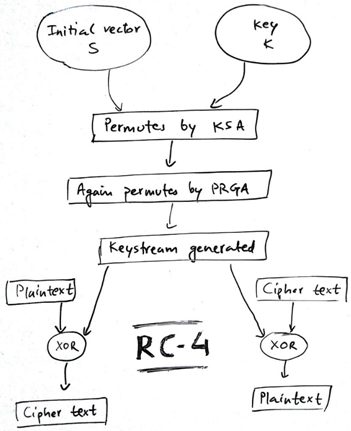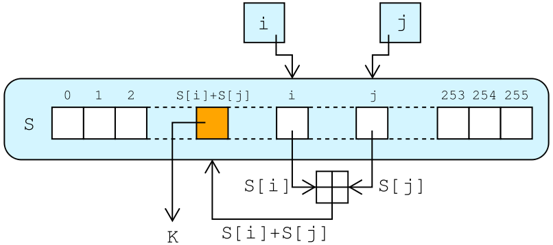RC4加密算法是一种对称加密算法。所谓对称加密算法,说得直白一点,就是加密与解密的过程一模一样。假设定义RC4的运算过程是 rc4(key, data),那么,密文 = rc4(key, 明文),明文 = rc4(key, 密文)。所以,对一段数据迭代地做奇数次RC4运算,就得到密文,对这段数据迭代地做偶数次RC4运算,结果依旧是原来的那段数据。
这种对称性就是基于密钥流的加密算法的一个特征。RC4加密算法也是一种基于密钥流的加密算法。何为密钥流呢?假设要加密的数据长N个字节,那么我通过某种算法,也产生一串N字节的数据,然后把这两串N字节数据按位异或(XOR),就得到了密文。把密文与这串密钥流再XOR,就能重新得到明文。而这一串由某种算法产生的N字节,或者说8N位,就叫做密钥流,而该算法就叫做密钥流生成算法。所有基于密钥流的加密算法的区别就在于密钥流的生成方式的不同。只要生成了与数据等长的密钥流,那么加密、解密方式都是把数据与密钥流做异或运算。
RC4本质上就是一种密钥流生成算法。它的特点是算法简单、运算效率高,而且非线性度良好。算法简单的特点使得可以使用硬件来实现RC4,如同在很多旧的无线网卡中就是使用硬件来实现WEP加密的。运算效率高使得用软件实现RC4也很便捷、不会占用过多CPU。而非线性度良好,则是RC4广泛使用的重要原因。所谓非线性度好,就是指通过密码产生密钥流容易,而通过密钥流逆推出密码则很难。
RC4算法的特点是算法简单,运行速度快,而且密钥长度是可变的,密钥长度范围为1-256字节。
RC4的算法原理
RC4算法主要包括两个部分:1)使用 key-scheduling algorithm (KSA)算法根据用户输入的秘钥key生成S盒;2)使用 Pseudo-random generation algorithm (PRGA)算法生成秘钥流用于加密数据。

利用Key生成S盒——The key-scheduling algorithm (KSA)
KSA算法初始化长度为256的S盒。第一个for循环将0到255的互不重复的元素装入S盒;第二个for循环根据密钥打乱S盒。
for i from 0 to 255
S[i] := i
endfor
j := 0
for i from 0 to 255
j := (j + S[i] + key[i mod keylength]) mod 256
swap values of S[i] and S[j]
endfor
利用S盒生成密钥流——The pseudo-random generation algorithm (PRGA)
Pseudo-random generation algorithm (PRGA)算法根据S盒生成与明文长度相同的秘钥流,使用秘钥流加密明文。秘钥流的生成如下图所示:

循环体中每收到一个字节,a和b定位S盒中的一个元素,并与输入字节异或,得到密文k;同时,c还改变了S盒。由于异或运算的特性,使得加密与解密过程一致。如果输入的是明文,输出的就是密文;如果输入的是密文,输出的就是明文。
i := 0
j := 0
while GeneratingOutput:
i := (i + 1) mod 256 //a
j := (j + S[i]) mod 256 //b
swap values of S[i] and S[j] //c
K := inputByte ^ S[(S[i] + S[j]) mod 256] //d
output K
endwhile
RC4算法的Python实现
#!/usr/bin/env python
# -*- coding: utf-8 -*-
# author: @manojpandey
# Python 3 implementation for RC4 algorithm
# Brief: https://en.wikipedia.org/wiki/RC4
# Will use codecs, as 'str' object in Python 3 doesn't have any attribute 'decode'
import codecs
MOD = 256
def KSA(key):
'''Key Scheduling Algorithm (from wikipedia):
for i from 0 to 255
S[i] := i
endfor
j := 0
for i from 0 to 255
j := (j + S[i] + key[i mod keylength]) mod 256
swap values of S[i] and S[j]
endfor
'''
key_length = len(key)
# create the array "S"
S = list(range(MOD)) # [0,1,2,...,255]
j = 0
for i in range(MOD):
j = (j + S[i] + key[i % key_length]) % MOD
S[i], S[j] = S[j], S[i] # swap values
return S
def PRGA(S):
'''Psudo Random Generation Algorithm (from wikipedia):
i := 0
j := 0
while GeneratingOutput:
i := (i + 1) mod 256
j := (j + S[i]) mod 256
swap values of S[i] and S[j]
K := S[(S[i] + S[j]) mod 256]
output K
endwhile
'''
i = 0
j = 0
while True:
i = (i + 1) % MOD
j = (j + S[i]) % MOD
S[i], S[j] = S[j], S[i] # swap values
K = S[(S[i] + S[j]) % MOD]
yield K
def get_keystream(key):
'''Takes the encryption key to get the keystream using PRGA
return object is a generator
'''
S = KSA(key)
return PRGA(S)
def encrypt_logic(key, text):
''':key -> encryption key used for encrypting, as hex string
:text -> array of unicode values/byte string to encrpyt/decrypt
'''
# For plaintext key, use this
key = [ord(c) for c in key]
# If key is in hex:
# key = codecs.decode(key, 'hex_codec')
# key = [c for c in key]
keystream = get_keystream(key)
res = []
for c in text:
val = ("%02X" % (c ^ next(keystream))) # XOR and taking hex
res.append(val)
return ''.join(res)
def encrypt(key, plaintext):
''':key -> encryption key used for encrypting, as hex string
:plaintext -> plaintext string to encrpyt
'''
plaintext = [ord(c) for c in plaintext]
return encrypt_logic(key, plaintext)
def decrypt(key, ciphertext):
''':key -> encryption key used for encrypting, as hex string
:ciphertext -> hex encoded ciphered text using RC4
'''
ciphertext = codecs.decode(ciphertext, 'hex_codec')
res = encrypt_logic(key, ciphertext)
return codecs.decode(res, 'hex_codec').decode('utf-8')
def main():
key = 'not-so-random-key' # plaintext
plaintext = 'Good work! Your implementation is correct' # plaintext
# encrypt the plaintext, using key and RC4 algorithm
ciphertext = encrypt(key, plaintext)
print('plaintext:', plaintext)
print('ciphertext:', ciphertext)
# ..
# Let's check the implementation
# ..
ciphertext = '2D7FEE79FFCE80B7DDB7BDA5A7F878CE298615'\
'476F86F3B890FD4746BE2D8F741395F884B4A35CE979'
# change ciphertext to string again
decrypted = decrypt(key, ciphertext)
print('decrypted:', decrypted)
if plaintext == decrypted:
print('\nCongrats! You made it.')
else:
print('Shit! You pooped your pants! .-.')
# until next time folks!
def test():
# Test case 1
# key = '4B6579' # 'Key' in hex
# key = 'Key'
# plaintext = 'Plaintext'
# ciphertext = 'BBF316E8D940AF0AD3'
assert(encrypt('Key', 'Plaintext')) == 'BBF316E8D940AF0AD3'
assert(decrypt('Key', 'BBF316E8D940AF0AD3')) == 'Plaintext'
# Test case 2
# key = 'Wiki' # '57696b69' in hex
# plaintext = 'pedia'
# ciphertext should be 1021BF0420
assert(encrypt('Wiki', 'pedia')) == '1021BF0420'
assert(decrypt('Wiki', '1021BF0420')) == 'pedia'
# Test case 3
# key = 'Secret' # '536563726574' in hex
# plaintext = 'Attack at dawn'
# ciphertext should be 45A01F645FC35B383552544B9BF5
assert(encrypt('Secret',
'Attack at dawn')) == '45A01F645FC35B383552544B9BF5'
assert(decrypt('Secret',
'45A01F645FC35B383552544B9BF5')) == 'Attack at dawn'
if __name__ == '__main__':
main()
参考链接:https://github.com/manojpandey/rc4
使用 pyCrypto 进行 RC4 加密解密
RC4 最初是一个商业秘密,但是在 1994 年 9 月被泄漏。因为名称“RC4”是商标,因此 RC4 通常被称为“ARCFOUR”或“ARC4”,以避免商标问题。
from Crypto.Cipher import ARC4
def encrypt(message, key):
des = ARC4.new(key)
cipher_text = des.encrypt(message)
return cipher_text
def decrypt(cipher_text, key):
des3 = ARC4.new(key)
message = des3.decrypt(cipher_text)
return message
if __name__ == "__main__":
key = "0123456789abcdef"
message = "www.biaodianfu.com"
cipher_text = encrypt(message, key)
print(cipher_text.hex().upper())
message = decrypt(cipher_text, key)
print(message.decode("utf-8"))
参考链接:




非常好的宝藏文. 希望能继续深入浅出的谈谈所有密码学原理和应用!非常感谢!